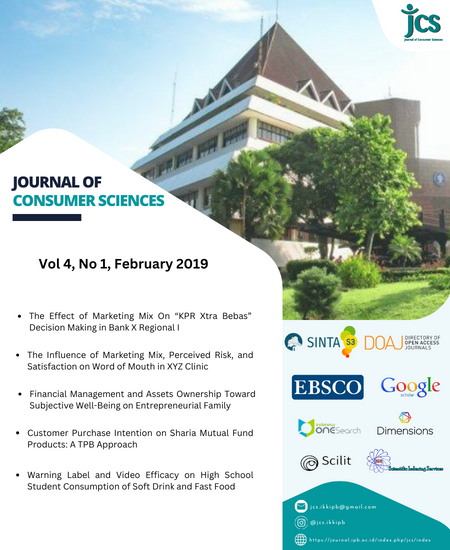Financial Management and Assets Ownership Toward Subjective Well-Being on Entrepreneurial Family
Abstract
This study aims to analyze the effect of financial management and asset ownership on subjective well-being on entrepreneurial families. This research was conducted on 90 families who had a business in Babakan Village, Dramaga District, Bogor Regency. The sampling method was using the purposive technique. Respondents in this study are husband or wife who owns and manage their business. Data analyzed descriptively and inferential statistics using multiple linear regression test. According to the research, entrepreneurial families have a low financial management index. Most families have assets at least three types. The level of subjective well-being of the entrepreneurial family is classified as moderate. Income and financial management have a significant positive effect on the subjective well-being of families. Asset ownership does not have a significant effect on subjective family well-being.
References
Achmad, N., Hidayat, L. (2013). Pengaruh manajemen aset terhadap kinerja keuangan perusahaan. Jurnal Ilmiah Manajemen Kesatuan, 1(1), 23-38
Biswas-Diener, R., Diener, E. (2006). The subjective well-being of the homeless, and lessons for happiness. Social Indicators Research, 76, 185–205.
[BPS] Badan Pusat Statistik. (2005). Pendataan Sosial Ekonomi Tahun 2005. http/www.bps.go.id.
_____. (2015). Jumlah Keluarga Berdasarkan Tahapan Keluarga Sejahtera di Jawa Barat, 2015. http/www.bps.go.id.
_____.(2017).Garis Kemiskinan Menurut Kabupaten/Kota, 2015-2017. http/www.bps.go.id.
Demetouw, M., Salle, A., Asnawi, M. (No Year). Pengaruh manajemen aset terhadap optimalisasi aset tetap pemerintah Kabupaten Jayapura. Jurnal Kajian Ekonomi dan Keuangan Daerah, 2(2), 1-12.
Diener, E., Pavot, W. (1993). Review of the satisfaction with life scale. Psychological Assessment, 164-172.
Diener, E., Scollon, CN, Lucas, RE. (2004). The evolving concept of subjective well-being: the multifaceted nature of happiness. Advances in Cell Aging and Gerontology, 187-220.
Guhardja, S., Puspitawati, H., Hartoyo dan Martianto, D., (1992). Diktat Manajemen Sumberdaya Keluarga, Jurusan Gizi Masyarakat dan Sumberdaya Keluarga, Fakultas Pertanian, IPB, Bogor.
Fajrin, F. (2011). Manajemen keuangan dan kesejahteraan keluarga perempuan buruh pabrik di Kabupaten Bogor [skripsi]. Departemen Ilmu Keluarga dan Konsumen, Fakultas Ekologi Manusia, Institut Pertanian Bogor, Bogor.
Firdaus, M. (2008). Manajemen Agribisnis. Jakarta, ID: Bumi Aksara
Helliwell, J.F., Putnam, R.D. (2004). The social context of well being. The Phil. Trans. R. Soc. Lond. B, 359, 1435-1446.
Iskandar, H., Sumarwan, U., Khomsan, A. (2006). Faktor-faktor yang memengaruhi kesejahteraan keluarga. Retrived from http://repository.usu.ac. id/bitstream/123456789/18931/1/ikm-des2006-10, 20(289), 29.
Johan, I.R., Muflikhati, I., Mukhti, DS. (2013). Gaya hidup, manajemen keuangan, strategi koping, dan kesejahteraan keluarga nelayan. Jurnal Ilmu Keluarga dan Konsumen, 6(1), 30-38.
Muflikhati, I., Hartoyo, Sumarwan, U., Fahrudin, A., Puspitawati, H. (2010). Kondisi sosial ekonomi dan tingkat kesejahteraan keluarga: kasus di wilayah pesisir Jawa Barat. Jurnal Ilmu Keluarga dan Konsumen, 3(1), 1-10.
Nanga, M. (2005). Makro Ekonomi: Teori, Masalah, dan Kebijakan. Jakarta, ID: PT Grafindo Persada.
Nickell, P., Dorsey, J.M. (1960). Management in Family Living (Third Edition). New York, US: John Willey and Sons, Inc.
Nirmaya, GC., Muflikhati, I., Simanjuntak, M. 2014. Pengaruh Program Corporate Social Responsibility (CSR) Terhadap Kesejahteraan Keluarga Di Sekitar Tambang. Jurnal Ilmu Keluarga dan Konsumen, 7 (1): 12-29.
http://journal.ipb.ac.id/index.php/jikk/article/view/9993/7813
Puspitawati, H. (2012). Gender dan Keluarga: Konsep dan Realita di Indonesia. Bogor, ID: IPB Press.
Puspitawati, H., Simanjuntak, M., Hayati, L. 2012. Kontribusi ekonomi dan peran ganda perempuan serta pengaruhnya terhadap kesejahteraan subjektif. Jurnal Ilmu Keluarga & Konsumen 5(1) :11-18 http://journal.ipb.ac.id/index.php/jikk/article/view/6333
Raharjo, I.T., Puspitawati, H., Krisnatuti, D. (2015). Tekanan ekonomi, mnaajemen keuangan, dan kesejahteraan pada keluarga muda. Jurnal Ilmu Keluarga dan Konsumen, 8(1), 38-48.
Rambe, A., Hartoyo., Karsin, E.S. (2008). Analisis alokasi pengeluaran rumah tangga dan tingkat kesejahteraan (kasus di Kecamatan Medan Kota, Sumatera Utara). Jurnal Ilmu Keluarga dan Konsumen, 1(1), 1-12.
Rodhiyah, R. (2012). Manajemen keuangan keluarga guna menuju keluarga sejahtera [skripsi]. Jurusan Ilmu Administrasi Bisnis, Fakultas Ilmu Sosial dan Politik, Universitas Diponegoro.
Rusydi, L.N. (2011). Analisis perbandingan manajemen sumber daya dan kesejahteraan keluarga pada keluarga miskin dan tidak miskin [skripsi]. Departemen Ilmu Keluarga dan Konsumen, Fakultas Ekologi Manusia, Institut Pertanian Bogor, Bogor.
Siregar, Doli, D. (2004). Management Asset Srategi Penataan Konsep Pembangunan Berkelanjutan secara Nasional dalam Konteks Kepala Daerah sebagai CEO’s pada Era Globalisasi dan Otonomi Daerah. Jakarta, ID: PT Gramedia Pustaka Utama.
Suandi. (2005). Hubungan Antara Social Capital dengan Kesejahteraan Keluarga di Daerah Perdesaan Provinsi Jambi [Tesis]. Sekolah Pascasarjana, Institut Pertanian Bogor, Bogor.
Titus, P.M., Fanslow, A.M., Hira, T.K. (1989). Effect of financial management knowledge money managers on financial outputs. Journals of Vocational Home Economics Education, 7(1), 58-70.
Utami, L.S.L., Muflikati, I., Simanjuntak, M. 2011. Family Perception and Participation and Its Influence on their Wealth. Economic Journal of Emerging Markets. 3(1): 43-53. https://doi.org/10.20885/ejem.v3i1.pp%25p. http://journal.uii.ac.id/index.php/JEP/article/view/2319
World Bank. (2004). Mewujudkan Pelayanan Umum bagi Masyarakat Miskin. Jakarta, ID: The World Bank.
Yulia. (2014). Mengelola keuangan bagi wirausaha pemula. Jurnal Khatulistiwa, 4(1), 11-27.
Yushita, A.N. (2017). Pentingnya literasi keuangan bagi pengelolaan keuangan pribadi. Jurnal Nominal, 4(1), 11-26.
Yohnson. (2004). Peran universitas di Surabaya dalam meningkatkan jumlah keluarga mapan di Surabaya (Seri penelitian keuangan keluarga). Jurnal Manajemen dan Kewirausahaan, 6(1), 54-72.
Authors
Authors who publish with this journal agree to the following terms:
- Authors retain copyright and grant the journal right of first publication with the work simultaneously licensed under a

This work is licensed under a Creative Commons Attribution 4.0 International License. that allows others to share the work with an acknowledgement of the work's authorship and initial publication in this journal. - Authors are able to enter into separate, additional contractual arrangements for the non-exclusive distribution of the journal's published version of the work (e.g., post it to an institutional repository or publish it in a book), with an acknowledgement of its initial publication in this journal.
- Authors are permitted and encouraged to post their work online (e.g., in institutional repositories or on their website) prior to and during the submission process, as it can lead to productive exchanges, as well as earlier and greater citation of published work (See The Effect of Open Access).







